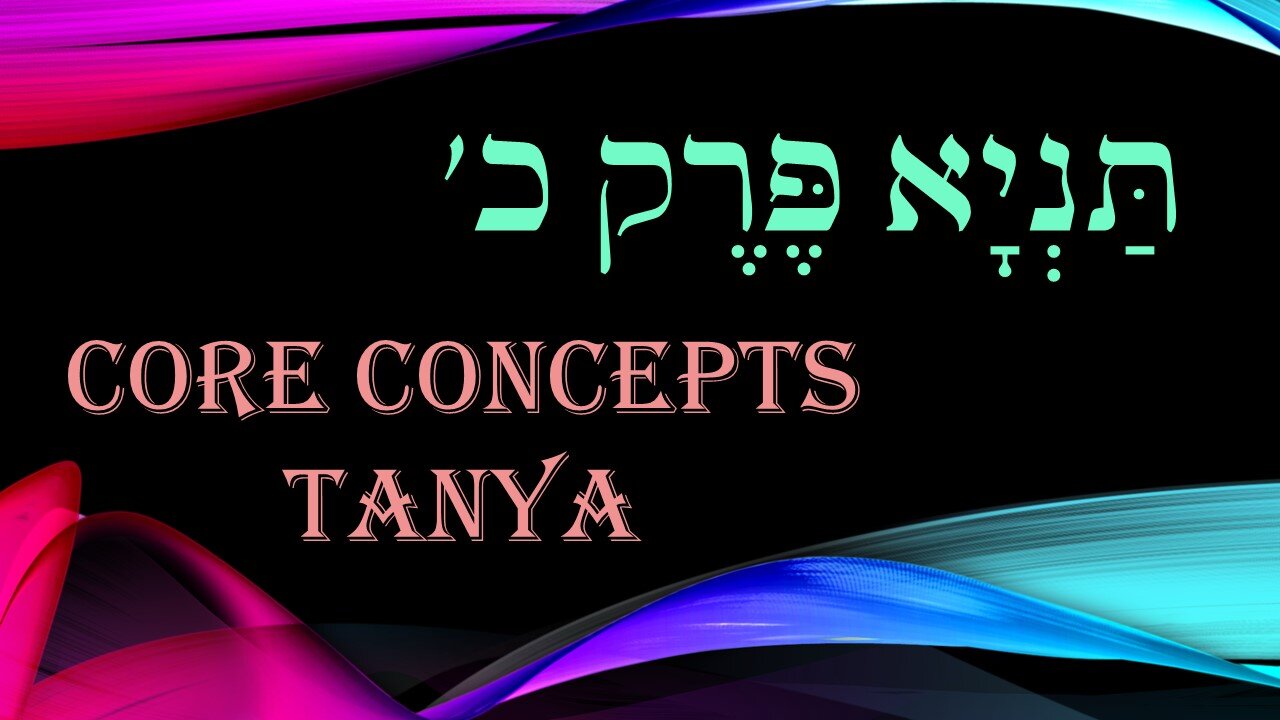Premium Only Content

Core Concepts Tanya: Chapter 20
Brief Recap of Chapter 20:
1. The previous chapters spoke about how every Jew has a "hidden love" buried deep within them, which is an inheritance from our forefathers. This love is safe in a place where k’lipah and "the other side" can't reach, because it’s beyond intellect. This is a place of humility and absolute submission to G-d, a place where G-d's essence can dwell. Therefore, no other force can enter such a place.
2. This hidden love is what we tap into to create a love of G-d, which is our desire to connect to Him, and a fear of G-d, which is our dread of separation. If a person sins, he is separating himself from G-d because he is acting against His will. This hidden love should keep us from ever sinning and always on the path of doing as G-d wants, but there are times when a "spirit of folly" overcomes a person and he rationalizes doing something that he shouldn't, or he mistakenly thinks whatever it is isn't so bad, or he convinces himself that this act won't affect his connection to G-d, etc.
3. To further understand these ideas of connection and separation, Chapter 20 begins to explain G-d's unity and how He is within this world. Because there's the way we see the world and then there's the way the world and reality actually are.
4. The first two of the Ten Commandments encompass the whole Torah. The first, "I am the L-rd your G-d" includes all the 248 positive mitzvot, because truly accepting G-d as G-d means fulfilling His will and doing what He wants. The second "You shall not have any other gods before me" includes all 365 prohibitive commandments, because accepting G-d as G-d means not doing anything that He doesn't want. A step further, any time someone does something he shouldn't he is "acknowledging" another god, aka idolatry. So it's not just about bowing to an idol, but also about doing anything that G-d tells us not to. The only way someone can defy His will is if he sees himself as separate from G-d's will.
5. Hashem is the only existence.
6. Hashem tells us that He is exactly the same G-d after creation as He was before, and that He has not changed. How is this possible if G-d created a world with which He interacts?
7. G-d created the world through speech.
8. In humans, for example, starting from the top, first there is a desire or craving....that desire is without words, it's just a sense...that desire enters the brain and forms into an emotion...that emotion goes to the heart which feels it....then it sends it back to the brain so it can form thoughts which will lead to the implementation of that original desire...at this point those thoughts take the shape of letters which take the shape of words.
OR what is one word compared to your gigantic power of speech?
Now take that gigantic power of speech and compare it to its source, which is thought. Thought is a humongous power compared to speech.
Now take that power of thought which can form letters into words which lead to speech and compare it to its source in the soul.
That power in the soul is gargantuan compared to the power of thought.
Now compare that gargantuan ability with that one single word.
That's like comparing one with infinity. It's so tiny compared with the potential of what could be.
9. This is how it is with G-d. Saying He created a world with words is comparing one to infinity. To Him, it's just a drop in the bucket. (Just an idea of the Power we're dealing with!) Also, G-d created the world, a something, from absolute nothing. Therefore, He has to constantly speak, aka create the world, so that it doesn't revert back to nothing.
-
 1:59:06
1:59:06
The Charlie Kirk Show
2 hours agoBlackpilled Zoomers + Charlie's Sabbath + Minnesota Meltdown | Bowyer, Turek, Glahn | 12.3.2025
47.7K14 -
 12:44
12:44
Dr. Nick Zyrowski
2 days agoThe REAL Benefits of One Meal A Day (OMAD) Intermittent Fasting
8.57K1 -
 2:30:50
2:30:50
Tucker Carlson
1 hour agoWhy Are You Gay? Milo Yiannopoulos Explains.
21.3K93 -
 LIVE
LIVE
Barry Cunningham
16 hours agoLIVE BREAKING NEWS: President Trump Addresses The Nation | Marco Rubio | Kash Patel | News!
1,965 watching -
 59:34
59:34
Timcast
2 hours agoNarco Boat Double Strike Triggers MASSIVE Political Firestorm, Admiral To Be QUESTIONED By Congress
132K72 -
 2:03:59
2:03:59
Side Scrollers Podcast
3 hours agoKaceytron Publicly Humiliated by H3H3 + Sabrina Carpenter/White House FEUD + More | Side Scrollers
30.8K4 -
 5:58
5:58
Buddy Brown
5 hours ago $0.80 earnedAngel CAUGHT ON CAMERA Saves Street Preacher from ATTACK! | Buddy Brown
15.9K13 -
 LIVE
LIVE
SternAmerican
1 day agoELECTION INTEGRITY CALL – WED, DEC 3 AT 2 PM EST | FEATURING TEXAS
124 watching -
 2:01:57
2:01:57
Steven Crowder
5 hours agoVintage MAGA: Trump's Epic Somalia Rant Isn't Racist - It's Irrefutable
365K264 -
 12:23
12:23
The Illusion of Consensus
4 hours agoThe Moment Dave Smith was Accused of Being A Holocaust Denier by Alex Berenson
13.9K2